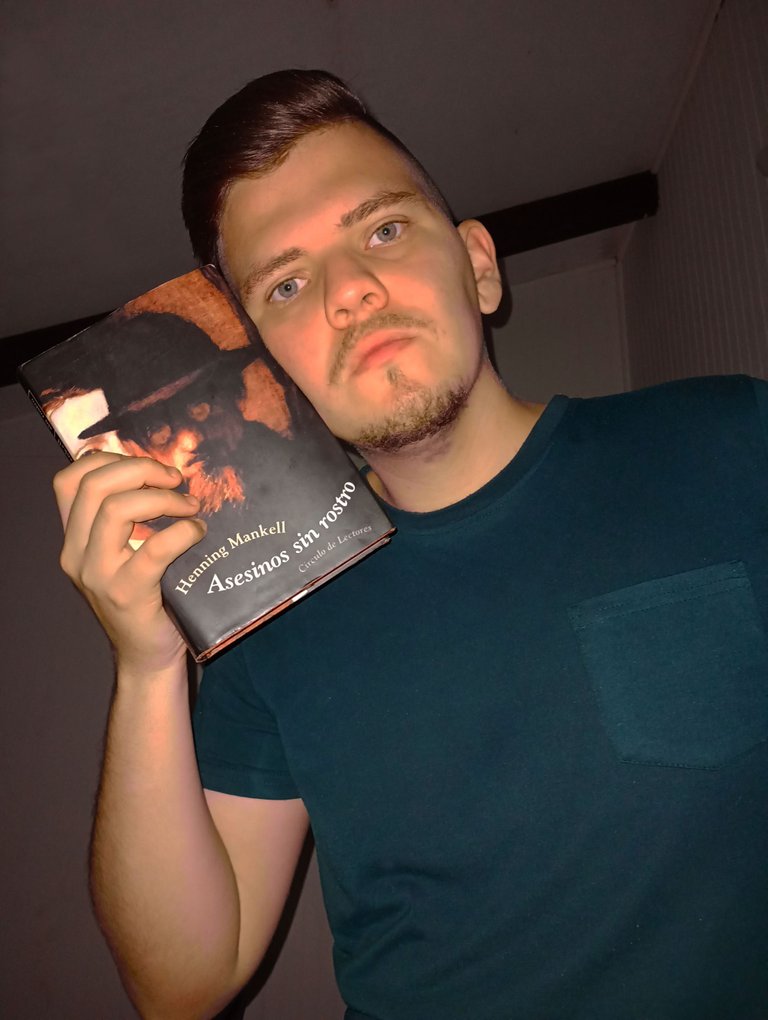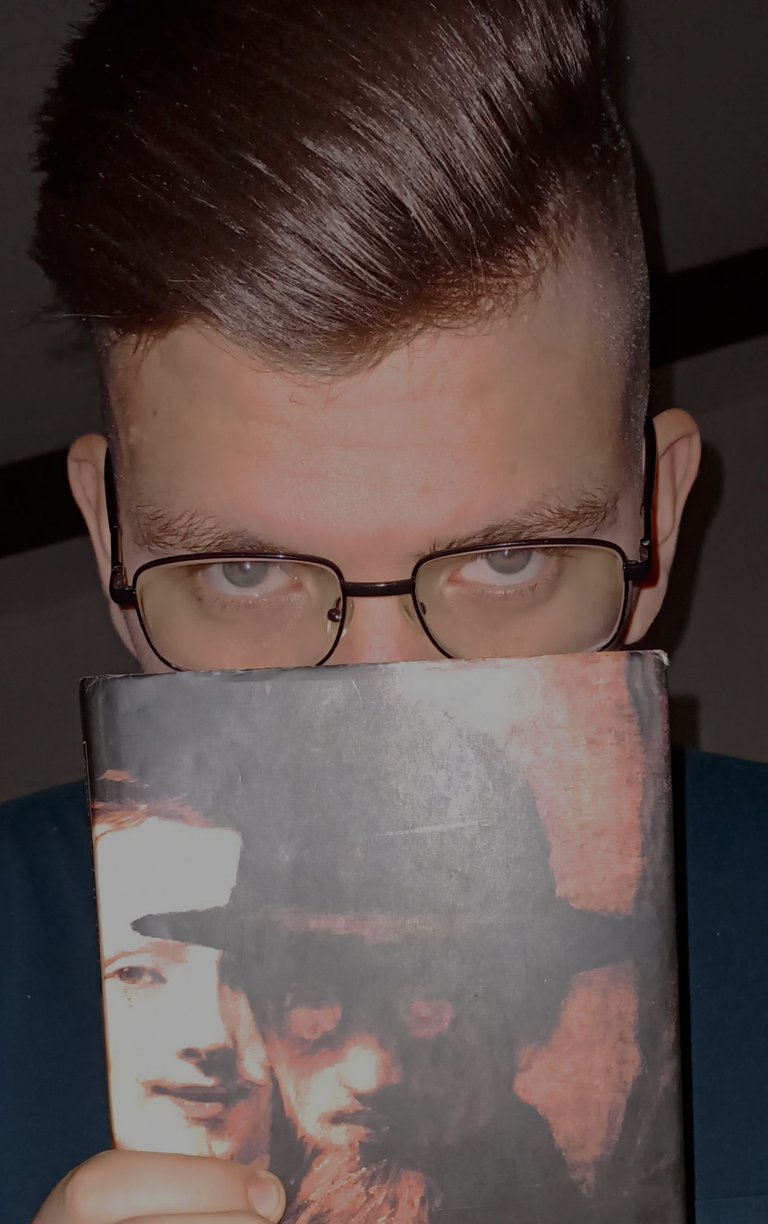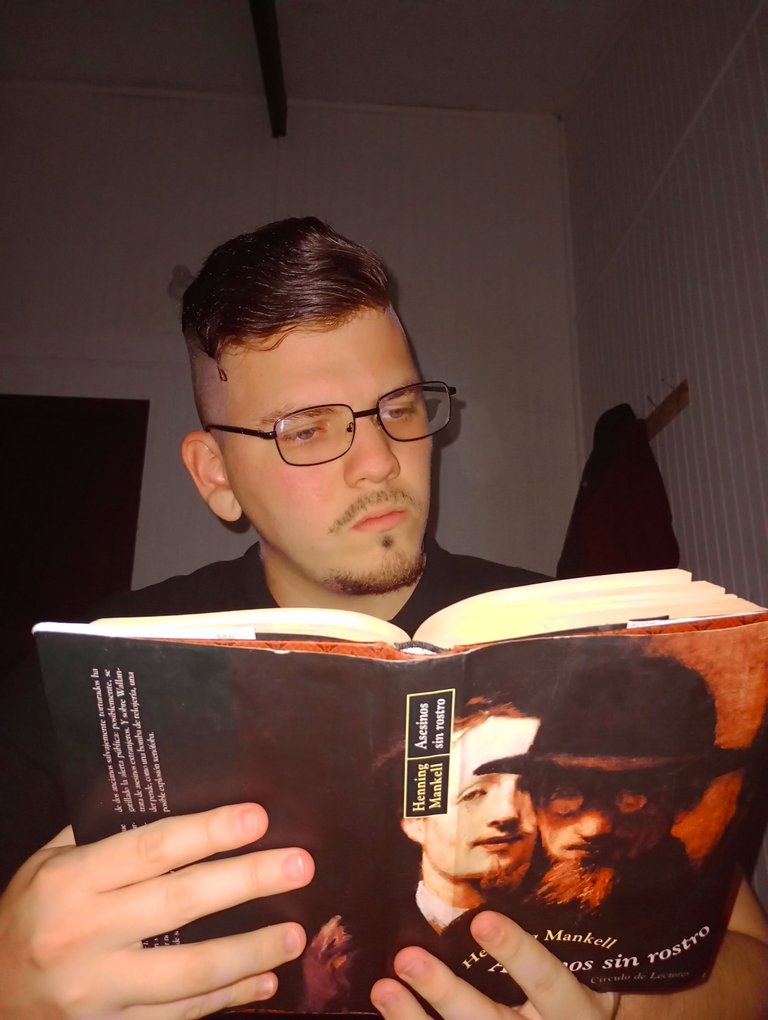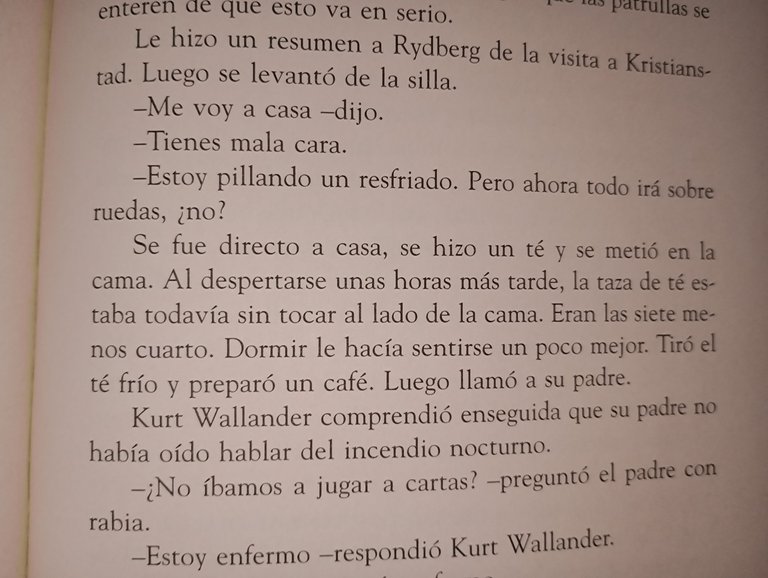
Tomando en cuenta la diferencia de la literatura latinoamericana con la europea siempre destaco diferentes puntos cuando una obra me conquista, pensando el hecho de que el latinoamericano de cierta manera escribe de una forma más rural, logra transmitirte a un sitio que, seas o no de origen hispanohablante (más precisamente, de américa) te lleva a ese sitio junto con él. Tengo cierta afinidad con Borges porque siento su obra un antónimo de la mía, él, templado y preciso, yo, más humilde soy, ciertamente escribo como si de hablar se tratase, termino quizás sobrepasando el vaso, la taza y el tazón.
Sin embargo, al leer la literatura de origen europeo de cierta forma siento como si se tratase de otra manera de vivir que aunque de igual forma me logra transmitir a Europa sin haber pisado jamás siquiera Madrid, yo no podría adaptar mi vida al movimiento diferente de las tonalidades europeas. No me malentiendan, no estoy diciendo bajo ninguna circunstancia que esté mal, solo que en medio de mi gama de grises no alcanzo a soñar vivir en la de ellos.
Por eso me atrae, como me atrae la química (que ciertamente entiendo bastante poco) y logro percibir un mensaje entre líneas. La obra de Henning Mankell “Asesinos sin rostros” me mantuvo atrapado en la lectura durante un día entero en el que me resigné a no comer y solo tomar agua por lo sediento que estaba de entender, como afrontamos de forma tan antagónica los mismos problemas en nuestra sociedad. Wallander (Protagonista) es un tipo bastante sobrio en su trabajo (bastante antagónico a su vida personal) que parece de cierta forma reflejarse en cualquier persona promedio del planeta que recién termina una relación que pensaron haber bautizado como su vida entera. Yo supongo que lo entiendo, de cierta forma también lo entiendo, también he dado por hecho muchas cosas que jamás debí dar por sentadas y pagué caro luego su falta, el dinero, de cierta forma, es una de esas cosas.
I woke up with fear this day...
Taking into account the difference between Latin American literature and European literature, I always highlight different points when a work conquers me, thinking about the fact that the Latin American in a certain way writes in a more rural way, manages to transmit you to a place that, whether or not you are of Spanish-speaking origin (more precisely, from America) takes you to that place together with him. I have a certain affinity with Borges because I feel his work to be an antonym of mine, he, temperate and precise, I, more humble, certainly write as if I were speaking, I end up perhaps surpassing the glass, the cup and the bowl.
However, when I read literature of European origin, in a certain way I feel as if it were another way of living that, although it manages to transmit me to Europe without ever having set foot in Madrid, I could not adapt my life to the different movement of European tonalities. Don't misunderstand me, I'm not saying under any circumstances that it's wrong, only that in the midst of my range of greys I can't dream of living in theirs.
That's why I'm attracted to it, just as I'm attracted to chemistry (which I certainly understand very little) and manage to perceive a message between the lines. Henning Mankell's "Murderers without faces" kept me trapped in reading it for a whole day in which I resigned myself to not eating and only drinking water because I was so thirsty to understand how we face the same problems in our society in such an antagonistic way. Wallander (Protagonist) is a pretty sober guy in his job (quite antagonistic to his personal life) who seems in a way to mirror any average person on the planet who has just ended a relationship they thought they had christened their whole life. I guess I get it, I kind of get it too, I've also taken a lot of things for granted that I should never have taken for granted and paid dearly for it later, money, in a way, is one of those things.

Al empezar con un asesinato, la obra es difícil de digerir para personas sensibles de mentes creativas (Irónico, ¿no?) entendiendo que, dadas las circunstancias, solo imaginarías a tus familiares siendo abatidos de forma tan sanguinaria que, a mí en lo personal, me puso nervioso y cerré mi mente (Oclumancia) para evitar repetir ese escenario en mi VLC mental. Solo entendiendo dos puntos: La muerte está al acecho siempre, y el miedo, junto con el agua, son nuestra fuente natural para mantener la vida. Yo, siendo de origen venezolano, tengo bien sabidas las dos caras de la moneda para con respecto a los migrantes, he sido el malo, he sido el bueno y he sido yo (esta última, de cierto modo, haciéndome sentir mejor).
Mankell nos cuenta la perspectiva del miedo al migrante por sus acciones, hay algo en ellos, hay algo en sus acciones, que suceden y nosotros también las hacemos, pero hay algo en ellos que es diferente, hay otra intención, no es lo mismo (visto en los ojos del temor) que un residente mate a que lo haga un migrante porque eso solo haría que lidere la anarquía.Si bien me parece absurdo, el miedo que nos guía constantemente nos lleva a pensar que realmente nosotros no somos los culpables.
La obra te atrapa y te enseña cómo es la sutil marcha de un humano desdichado mientras intenta cambiar su vida pero no logra nada, no solo por falta de voluntad, si no por intentar ser más allá de aquello que nos permite pensar la mente. Citando a Camus en el mito de sisífo, nuestras acciones que de alguna forma buscan sentido son las que nos acaban desdichando, el absurdismo como práctica suele ser la mejor manera de llevar las cosas. Dando a entender que realmente las personas no son malas por ser Venezolanos o Suecos, son malos porque hacen cosas malas, por más que parezca un dialogo de una película de marvel (xd)
By starting with a murder, the play is difficult to digest for sensitive people with creative minds (ironic, isn't it?) understanding that, given the circumstances, you would only imagine your family members being shot down in such a bloody way that, for me personally, it made me nervous and I closed my mind (Occlumency) to avoid repeating that scenario in my mental VLC. Just understanding two points: Death is always lurking, and fear, along with water, are our natural source to sustain life. I, being of Venezuelan origin, am well aware of the two sides of the coin with respect to migrants, I have been the bad guy, I have been the good guy and I have been me (the latter, in a way, making me feel better).
Mankell tells us the perspective of the fear of the migrant for his actions, there is something in them, there is something in their actions, they happen and we do them too, but there is something in them that is different, there is another intention, it is not the same (seen in the eyes of fear) that a resident kills than a migrant does because that would only lead to anarchy, although it seems absurd, the fear that constantly guides us leads us to think that we are not really the guilty ones.
The play grips you and shows you what the subtle march of a wretched human is like as he tries to change his life but fails to achieve anything, not only for lack of will, but for trying to be beyond what the mind allows us to think. To quote Camus in the myth of Sisyphus, our actions that somehow seek meaning are the ones that end up making us unhappy, absurdism as a practice is often the best way of going about things. Implying that people are not really bad because they are Venezuelan or Swedish, they are bad because they do bad things, even if it sounds like a line from a Marvel movie (xd).

En el desarrollo de la trama que se alcanza a ver, los personajes reflejan personas en cada punto de vista de la vida cotidiana, y yo, que presumo de que me sobra el tiempo (que tonto puedo ser), me tomaré la molestia de ennumerarlos:
- Profesional:
Rydberg, que tiende a ser el policía que más molestaría al lector en otra circunstancia, me resulta sencillamente pasional. Considerando que estuvo casi siempre al borde de la muerte, enviarlo a cualquier campo era saber que no quedaría una esquina sin inspeccionar. Era como García Márquez al describir un lápiz, no iba a haber marca que no supieses que existía. - Pasional:
Ebba, esta telefonista me parece bastante curiosa. Una vez leí en algún sitio (sabrá Dios dónde) que al igual que los jugadores de futbol que comparten mucho tiempo en un mismo club, los “jefes” y secretarios suelen conocerse en un lenguaje no verbal y de cierta forma, los compañeros de trabajo suelen ser nuestras “medias mitades” de alguna parte de la vida. - Fantasmas:
Cathrin (o Cattis), los fantasmas que nos atormentan son estrategas de surgir en momentos inoportunos, no sé qué planea el destino pero está ahí, siempre recordándonos que aquello que tanto anhelábamos, no nos pertenece. Este tipo de personajes suelen ser complementos que solo influyen en el desarrollo del personaje, más no de la trama, eso los vuelve interesantes porque el autor debe ser preciso a la hora de integrarlos. Son pistolas de bala de salva, no son para matar, son para aprender. - Víctima:
Siendo Nyström y el padre de Wallander personajes que se revelan de forma pasiva y temerosa, nos muestran la vulnerabilidad del ser humano cuando la longevidad comienza a abrazarlos. Nyström fue víctima del temor de la vejez y el zarandeo constante de la rutina, al ver a quién fue su amigo durante más de 40 años hecho un animal de prueba en un salón de biología de primer año de bachillerato, cualquiera esperaría que enloqueciera, sobretodo porque tanto Johannes como María habían muerto de forma estrepitosa y eso, como vía mínima, atormentaría al matrimonio vecino por el resto de sus días.
En el caso del padre de wallander se podría decir que de igual forma es una víctima del tiempo, la longevidad mal mezclada puede asesinarnos, yo tampoco he tenido nunca una buena relación con mi padre, así que leyendo la situación solo pensaba en qué pasaría conmigo si mi padre se viese en un aprieto como ese, ¿Podría dedicarle el tiempo suficiente? ¿Será mi padre una víctima de mi desinterés y desasosiego?
Las víctimas en las obras literarias no son personas de las cuáles puedas o debas sentir lastima, es una manera que quizás el mundo tiene de advertirnos que nuestros errores nos pueden llevar por esos caminos, no existe tal cosa como la lastima cuando se tiene voluntad, leemos para aprender, las historias “ficticias” no son una excepción.
Voy a dejar el resto de personajes destacados para el resto de obras del inspector Wallander, por supuesto que me encanta de destacar cada sutileza en las obras, pero abusar de eso me haría caer en lo absurdo.
As the plot unfolds, the characters reflect people in every point of view of everyday life, and I, who presume to have plenty of time on my hands (what a fool I can be), will take the trouble to list them:
- Professional:
Rydberg, who tends to be the cop who would otherwise annoy the reader the most, comes across to me as simply passionate. Considering that he was almost always on the verge of death, to send him into any field was to know that no corner would be left unchecked. It was like García Márquez describing a pencil, there wasn't going to be a mark you didn't know existed.- Passionate:
Ebba, I find this telephone operator quite curious. I once read somewhere (God knows where) that like football players who share a lot of time at the same club, "bosses" and secretaries tend to know each other in non-verbal language and in a way, co-workers tend to be our "half-halves" in some part of our lives.- Ghosts:
Cathrin (or Cattis), the ghosts that haunt us are strategists of emerging at inopportune moments, I don't know what fate plans but it is there, always reminding us that what we so longed for, doesn't belong to us. This kind of characters are usually complements that only influence the development of the character, but not the plot, that makes them interesting because the author must be precise when integrating them. They are pistols with blanks, they are not for killing, they are for learning.- Victim:
Nyström and Wallander's father being characters who reveal themselves in a passive and fearful way, they show us the vulnerability of the human being when longevity begins to embrace them. Nyström was a victim of the fear of old age and the constant jolt of routine, to see his friend of over 40 years made into a test animal in a first-year high school biology classroom, anyone would expect him to go mad, especially since both Johannes and Maria had died so shockingly and that, at the very least, would haunt the neighbouring couple for the rest of their days.
In the case of Wallander's father, one could say that he is also a victim of time, longevity badly mixed up can kill us, I have never had a good relationship with my father either, so reading the situation I only thought about what would happen to me if my father found himself in a predicament like that, could I devote enough time to him, would my father be a victim of my disinterest and unease, would he be a victim of my disinterest and unease?
Victims in literary works are not people you can or should feel sorry for, it is perhaps the world's way of warning us that our mistakes can lead us down such paths, there is no such thing as pity when there is a will, we read to learn, "fictional" stories are no exception.
I'm going to leave the rest of the characters highlighted for the rest of Inspector Wallander's works, of course I love to highlight every subtlety in the works, but to abuse that would make me fall into absurdity.

Continuando con la trama, los thriller no pueden ser sucesos con pausas, la sensación que te transmite un buen thriller es la de un enfrentamiento policial. Una balacera sería la mejor manera de describir la adrenalina, yo no sé si sobreviviría a una porque soy sumamente torpe a nivel físico pero si de algo estoy seguro es que a través de la lectura, solo en la profundidad de ella, puedo ser parte de la experiencia de la adrenalina.
Así como se nos presentan diferentes escenarios, supongo que esos pequeños “descansos” de wallander donde (no) puede dormir son esa parte de la persecución/enfrentamiento donde se guardan detrás de un automóvil para intentar distraer a la muerte, es un segundo de respiro pero no quiere decir que realmente estés a salvo, solo estás en standby.
Continuing with the plot, thrillers cannot be events with pauses, the feeling a good thriller gives you is that of a police confrontation. A gunfight would be the best way to describe the adrenaline, I don't know if I would survive one because I'm physically clumsy, but if there's one thing I'm sure of, it's that through reading, just in the depth of it, I can be part of the adrenaline experience.
As well as we are presented with different scenarios, I guess those little "breaks" of wallander where he (can't) sleep are that part of the chase/confrontation where they are kept behind a car to try to distract death, it's a second of respite but it doesn't mean you're really safe, you're just on standby.

Mediante la obra transcurre llegas a pensar que el paradero del asesino no será concretado, te sientes en ese mismo suspenso una y otra vez, como pensar que terminas la jornada laboral y ver que faltan 30 minutos, es una putada como un puñal, pero es necesario.
Cuando descubres lo sutil que puede llegar a ser la situación, no puedes llegar a pensar que sea tan macabra, dos asesinos, dos psicópatas, atendiendo cualquier sitio donde vayas, imagínalos, sin rostro, día a día te burlas de ellos, te aprovechas, tomas partido para cada día hacerlo sentir más miserable sin tener ni una mísera idea de lo que esa persona sería capaz de hacerte si lo provocas lo suficiente, no sabes quién es, nunca lo sabrás y vivirás orgulloso de tu ignorancia hasta que vayas al sobre.
La obra te transmite el miedo que sienten las personas, el deseo anarquía de grupos minoritarios de extremistas, te atrapa en ese sentimiento y te hace sentir, que de una u otra forma, tú también sabes quiénes son esos famosos “asesinos sin rostro”
Y en mi caso, me dejó un poco el deseo de que cada policía fuese igual que Wallander, un mediocre padre y marido, más, un excelente policía.
As the play unfolds you come to think that the killer's whereabouts will not be determined, you feel in that same suspense over and over again, like thinking that you finish the working day and see that there are 30 minutes to go, it's as bad as a dagger, but it's necessary.
When you discover how subtle the situation can be, you can't get to think that it is so macabre, two murderers, two psychopaths, attending any place you go, imagine them, faceless, day by day you make fun of them, you take advantage of them, you take sides to make them feel more miserable every day without having the slightest idea of what that person would be capable of doing to you if you provoke them enough, you don't know who they are, you will never know and you will live proud of your ignorance until you go to the envelope.
The play conveys the fear that people feel, the desire for anarchy of minority groups of extremists, it traps you in that feeling and makes you feel, that in one way or another, you also know who those famous "faceless killers" are.
And in my case, it left me with a little wish that every policeman was just like Wallander, a mediocre father and husband, more, an excellent policeman.
~~Todas las fotos mías con la obra referencial son con un ejemplar de la editorial "Círculo de Lectores", desconozco país de procedencia porque fue un regalo, pero espero sirva de referencia para aquél interesado en el ejemplar en físico. ~~
~~All the photos of me with the referential work are with a copy of the publishing house "Círculo de Lectores", I don't know the country of origin because it was a gift, but I hope it serves as a reference for those interested in the physical copy. ~~
- Ken Scamander.
The rewards earned on this comment will go directly to the people( @macchiata ) sharing the post on Twitter as long as they are registered with @poshtoken. Sign up at https://hiveposh.com.
Your review is captivating, you seemed to have gone an extra mile in reading this book, anyways welcome to hivebookclub, have a lovely stay here, and lastly I love the plot, seems very relatable.